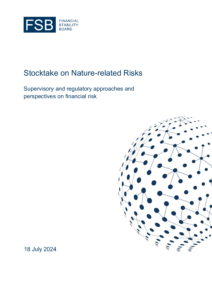Press enquiries:
+41 61 280 8477
[email protected]
Ref: 17/2024
-
Report finds that financial authorities are at different stages of evaluating the relevance of financial risks from biodiversity loss and other nature-related risks.
-
Report notes the major data and modelling challenges faced by analytical work to connect underlying nature risks with financial exposures and to translate estimates of financial exposures into measures of financial risk.
-
Regulatory and supervisory work is at an early stage globally, with diverse approaches across jurisdictions, typically including the promotion of firm-level disclosures. A number of capacity-building initiatives are underway.
The Financial Stability Board (FSB) today published a stocktake of member financial authorities’ initiatives related to the identification and assessment of nature-related financial risks. The stocktake, which will be delivered to the 25-26 July meeting of G20 Finance Ministers and Central Bank Governors in Rio de Janeiro, describes not only supervisory and regulatory initiatives, but central banks’ and supervisors’ analytical work on whether and how nature degradation, including loss of biodiversity, is a financial risk.
The report highlights a number of observations:
Financial authorities are at different stages of evaluating the relevance of biodiversity loss and other nature-related risks as a financial risk, with approaches varying, in part due to differing mandates. Some authorities have already concluded there is a material financial risk, while others remain at the stage of monitoring international work on the issue. A few authorities have decided not to work on this topic, due to data gaps and the need to give sufficient priority to climate risks (where analytical thinking and data are further progressed).
Financial authorities which are analysing the issue categorise nature-related risks into the same two types of risks typically used in climate-related financial risk analysis: physical and transition risks. However, analytical work faces major data and modelling challenges. Authorities’ work to date indicates that financial institutions face large exposures to physical risk via their investments and financing activities, but that analytical work needs to be further developed to better translate estimates of financial exposures into measures of risk. Authorities recognise the strong connections between climate risk and nature, and that more needs to be done to develop a more holistic approach that considers interdependencies between climate- and nature-related financial risks.
Regulatory and supervisory work is also at an early stage globally, and approaches differ considerably across jurisdictions and institutions. That said, a number of authorities from both emerging markets and advanced economies already have regulatory and supervisory initiatives underway. The report highlights examples of approaches taken by international organisations and authorities. There is a general recognition that more expertise is needed in the supervisory community, in central banks, and in the private sector to understand and, where needed, address nature-related risks. A number of capacity building initiatives are underway from around the world.
Notes to editors
The stocktake draws on a survey of participating FSB members and the work done by international organisations, including the conceptual framework developed by the Network for Greening the Financial System (NGFS) and work done by the Organisation for Economic Co-operation and Development (OECD), and funded by the European Union, on nature-related risks.
The FSB coordinates at the international level the work of national financial authorities and international standard-setting bodies and develops and promotes the implementation of effective regulatory, supervisory, and other financial sector policies in the interest of financial stability. It brings together national authorities responsible for financial stability in 24 countries and jurisdictions, international financial institutions, sector-specific international groupings of regulators and supervisors, and committees of central bank experts. The FSB also conducts outreach with approximately 70 other jurisdictions through its six Regional Consultative Groups.
The FSB is chaired by Klaas Knot, President of De Nederlandsche Bank. The FSB Secretariat is located in Basel, Switzerland and hosted by the Bank for International Settlements.
